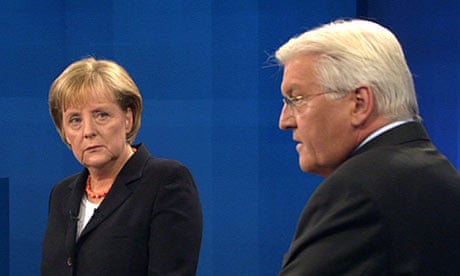The Social Democratic underdog in Germany's lacklustre election campaign appeared to score a surprising points victory against the chancellor, Angela Merkel, last night in the sole television showdown of the campaign.
In what was painted as a potential turning point a fortnight before general elections, Frank-Walter Steinmeier, a rival and partner in the current Merkel government, was seen to have come out ahead.
A poll of viewers immediately after the 90-minute debate, broadcast live on four national television channels, gave Steinmeier a 31-21 margin of victory, while 48% thought the "TV duel" was a draw.
Steinmeier's performance is unlikely to dent the prospect of victory for Merkel's Christian Democrats (CDU) who are around 13 points ahead of his SPD in the opinion polls. But the unexpectedly strong showing by Steinmeier could ruin the electoral arithmetic, spoiling Merkel's hopes of ditching the SPD in favour of a centre-right coalition with the smaller liberal Free Democrats (FDP).
Merkel and Steinmeier, rivals for the chancellorship, are partners in the current grand coalition of the CDU and SPD, with Steinmeier serving as Germany's foreign minister and vice-chancellor.
The co-responsibility of both contenders for the last four years inhibited last night's confrontation, with the party leaders repeatedly agreeing and making common points on foreign policy, such as the war in Afghanistan, or the financial and economic crisis.
The TV debate frequently saw the two rivals allied in common purpose against the four journalists grilling them. "You're like an old married couple," one of the questioners told them. "Very harmonious."
Two weeks before the vote, much was at stake in the contest, with pundits hoping the debate would enliven a campaign that has been disappointing, routinely described as soporific.
Last night's lack of fireworks, despite the best efforts of the interviewers, confirmed the bland tenor of the election campaign.
With five main parties fighting for votes in a proportional system, there is a sense that the German voter is being cheated, since the main contenders are reluctant to commit and will trim their policies depending on who they can form a coalition with after the ballot.
The clearest division last night was over the future of nuclear energy in Germany, with Steinmeier committed to phasing it out, while Merkel wanted to at least delay Germany's nuclear exit beyond the cut-off date of 2020.
Foreign policy or European issues were completely ignored in the TV encounter, with the brief exception of the war in Afghanistan, highly unpopular in Germany and which has erupted into the campaign because of the botched bombing of oil tankers 10 days ago that left dozens of civilians dead near Kunduz in the north of the country.
A German officer ordered the Nato raids, to the consternation of Nato allies, triggering a bout of soul-searching at home. Around 60% of Germans, according to opinion polls, support a prompt withdrawal of the 4,200 German troops in Afghanistan.
Steinmeier disclosed a 10-point plan aimed at listing the terms for withdrawal over the four-year life of the next parliament, while Merkel hinted that conditions could be right to leave Afghanistan in five years, after joining French and British leaders in calling for a major international conference on the crisis. There was no dispute, though, between the centre-right and centre-left leaders.
